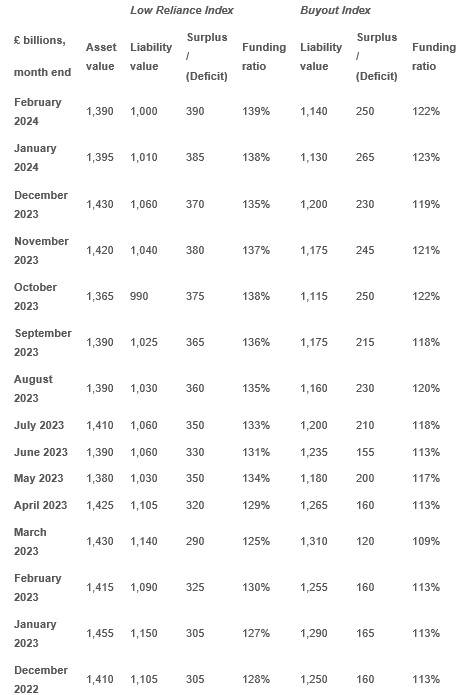This is based on one of the options being considered in the consultation where schemes could release surplus above 105% of their Low Reliance liabilities.
This analysis is in conjunction with a record surplus for PwC’s Low Reliance index, which shows that the UK’s 5,000-plus corporate DB pension schemes reached £390bn in February. This assumes that the UK’s pension schemes invest in low-risk, income-generating assets like bonds, meaning they are unlikely to call on the sponsor for further funding.
Meanwhile PwC’s Buyout Index - which tracks the position of the UK’s DB schemes against an estimated cost of insurance buyout - also continues to show that, on average, schemes have sufficient assets to ‘buy out’ their pension promises with insurance companies. This recorded a surplus of £250bn this month despite some recent tightening of pricing in the market.
In light of the surplus position, and the flexibility highlighted in DWP’s consultation, sponsors and trustees should start to re-evaluate the long-term strategy for their pension schemes.
John Dunn, head of pensions funding and transformation at PwC, said:With schemes increasingly reaching and maintaining surplus positions on a Low Reliance measure, the question for sponsors and trustees is how best to use and manage that surplus. The recent consultation discusses an option under which a scheme could release surplus assets above 105% of its Low Reliance liabilities. Our research indicates that this is currently equivalent to £340bn that could be used to utilise UK investment or make payments to members and the sponsoring employer.
“The consultation also explores the potential value in introducing a ‘super levy’ payable to the Pension Protection Fund (PPF) to provide protection of members’ full benefits on sponsor insolvency. So this combination of removing barriers around extracting “trapped” surplus for the benefit of the members and/or the sponsor, whilst at the same time enhancing safeguards for member benefits, could cause a significant shift in the pensions landscape and in the choices made on the best strategy for each scheme. DB pension schemes, once seen as a drag on business performance requiring significant financing, could now be viewed as a real asset on the balance sheet.”
Matt Cooper, head of alternative pension solutions at PwC, added: “The consultation will also consider a model for a public sector vehicle run by the PPF that will consolidate schemes that can not easily access the insurance buyout market - so likely smaller or less well funded schemes. If this comes in by 2026, as proposed, it would provide a new endgame destination for a significant number of DB pension schemes. While there will be operational changes that have to be overcome - for example, it won’t be an easy feat to move individual schemes onto a standard benefit structure - this could provide an alternative lower cost and secure solution for these schemes.
“The immediate question for smaller schemes targeting buyout is whether to change tack, or at least apply the brakes so that they can take stock of their position and strategy. We’re already seeing some schemes delaying insurance transactions while they reassess their options in the wake of the consultation - and with buyout pricing showing signs of hardening in response to changing market conditions and increased demand, others may choose to do the same. It’s not just smaller schemes that need to take action in light of the consultation, though - all sponsors and trustees should be re-evaluating the target strategy for their schemes in light of the proposed changes.”
The PwC Low Reliance Index and PwC Buyout Index figures are as follows:

|

